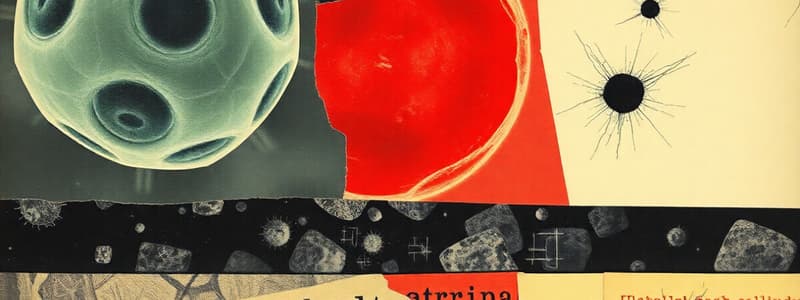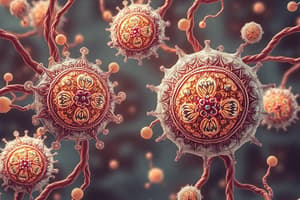Podcast
Questions and Answers
What is the term used to describe the development history of a cell from its birth to its final differentiation?
What is the term used to describe the development history of a cell from its birth to its final differentiation?
- Cell lineage
- Cell niche
- Cell asymmetry
- Cell fate (correct)
Which statement best describes stem cells?
Which statement best describes stem cells?
- Unspecialized cells that can self-renew and differentiate (correct)
- Cells that only multiply without differentiation
- Specialized cells that cannot reproduce
- Differentiated cells from adult tissues
What characterizes adult stem cells?
What characterizes adult stem cells?
- Developed from a stem cell in adult tissues (correct)
- Found only in embryos
- Totipotent in nature
- Exclusively pluripotent
How can cell fate in an embryo be determined?
How can cell fate in an embryo be determined?
Which of the following is NOT a category of stem cell?
Which of the following is NOT a category of stem cell?
What is the primary role of the apoptosome?
What is the primary role of the apoptosome?
What defines asymmetric cell division?
What defines asymmetric cell division?
Which term describes stem cells that can give rise to all cell types of the organism?
Which term describes stem cells that can give rise to all cell types of the organism?
What type of cells can multipotent cells develop into?
What type of cells can multipotent cells develop into?
What do transiently amplifying cells do?
What do transiently amplifying cells do?
How frequently does the intestinal epithelium renew itself in adult humans?
How frequently does the intestinal epithelium renew itself in adult humans?
What is the role of the niche in stem cell maintenance?
What is the role of the niche in stem cell maintenance?
Where do intestinal stem cells reside?
Where do intestinal stem cells reside?
What does the Wnt signaling pathway influence in intestinal stem cells?
What does the Wnt signaling pathway influence in intestinal stem cells?
What do Lgr5+ stem cells differentiate into?
What do Lgr5+ stem cells differentiate into?
Which stem cells replenish needed blood cells?
Which stem cells replenish needed blood cells?
What type of stem cells are obtained from fetuses?
What type of stem cells are obtained from fetuses?
What is the differentiation potential of embryonic stem cells?
What is the differentiation potential of embryonic stem cells?
At which stage of development are totipotent cells found?
At which stage of development are totipotent cells found?
What is the primary characteristic of induced pluripotent stem cells (iPS)?
What is the primary characteristic of induced pluripotent stem cells (iPS)?
What are the cells found in the inner cell mass of the blastocyst called?
What are the cells found in the inner cell mass of the blastocyst called?
Which of the following statements is true about adult stem cells?
Which of the following statements is true about adult stem cells?
Which factors control the pluripotency of embryonic stem cells?
Which factors control the pluripotency of embryonic stem cells?
What unique capability do embryonic stem cells have that adult stem cells do not?
What unique capability do embryonic stem cells have that adult stem cells do not?
What do Lgr5+ cells differentiate into when Notch signaling is present?
What do Lgr5+ cells differentiate into when Notch signaling is present?
What is the primary function of Paneth cells?
What is the primary function of Paneth cells?
Which cells can restore Lgr5+ stem cells following injury?
Which cells can restore Lgr5+ stem cells following injury?
What do telocytes primarily provide in the intestinal environment?
What do telocytes primarily provide in the intestinal environment?
Which type of cells are specialized in secreting mucus?
Which type of cells are specialized in secreting mucus?
What is the role of iPS cells in medical research?
What is the role of iPS cells in medical research?
Which type of cells take up intestinal microbial antigens?
Which type of cells take up intestinal microbial antigens?
What do symmetric cell divisions produce?
What do symmetric cell divisions produce?
What is required for asymmetric cell division to occur?
What is required for asymmetric cell division to occur?
What happens to daughter cells if the mitotic spindle is not appropriately oriented?
What happens to daughter cells if the mitotic spindle is not appropriately oriented?
What is one of the steps in generating polarized cells?
What is one of the steps in generating polarized cells?
What are cell polarity determinants required for?
What are cell polarity determinants required for?
What triggers apoptosis in vertebrate cells?
What triggers apoptosis in vertebrate cells?
Which of the following is a component of conserved apoptotic pathways?
Which of the following is a component of conserved apoptotic pathways?
What is the primary role of trophic factors in vertebrate cells?
What is the primary role of trophic factors in vertebrate cells?
How is cell polarity reinforced after initial establishment?
How is cell polarity reinforced after initial establishment?
What is the primary role of caspases in cell death?
What is the primary role of caspases in cell death?
What is the outcome of apoptotic cell fragmentation?
What is the outcome of apoptotic cell fragmentation?
Which protein family is involved in the regulation of apoptosis?
Which protein family is involved in the regulation of apoptosis?
What triggers the oligomerization of Bax or Bak proteins?
What triggers the oligomerization of Bax or Bak proteins?
How do pro-apoptotic BH3-only proteins promote apoptosis?
How do pro-apoptotic BH3-only proteins promote apoptosis?
What effect does the binding of extracellular trophic factors have on apoptosis?
What effect does the binding of extracellular trophic factors have on apoptosis?
What happens to Bad protein upon phosphorylation?
What happens to Bad protein upon phosphorylation?
Which event triggers the synthesis of the Puma gene?
Which event triggers the synthesis of the Puma gene?
Flashcards
Stem Cell
Stem Cell
An unspecialized cell capable of self-renewal and differentiating into specialized cells.
Cell Fate
Cell Fate
The developmental path a cell takes, from its birth to differentiation into a specific type.
Cell Lineage
Cell Lineage
The chronological order of a cell's descent, showing how it relates to other cells in development.
Apoptosis
Apoptosis
Signup and view all the flashcards
Apoptosome
Apoptosome
Signup and view all the flashcards
Asymmetric Cell Division
Asymmetric Cell Division
Signup and view all the flashcards
Symmetric Cell Division
Symmetric Cell Division
Signup and view all the flashcards
Bcl-2 Family
Bcl-2 Family
Signup and view all the flashcards
Caspases
Caspases
Signup and view all the flashcards
Multipotent
Multipotent
Signup and view all the flashcards
Pluripotent
Pluripotent
Signup and view all the flashcards
Totipotent
Totipotent
Signup and view all the flashcards
Progenitor cells
Progenitor cells
Signup and view all the flashcards
Embryonic stem cells
Embryonic stem cells
Signup and view all the flashcards
iPS cells
iPS cells
Signup and view all the flashcards
Fetal Stem Cells
Fetal Stem Cells
Signup and view all the flashcards
Embryonic Stem Cells
Embryonic Stem Cells
Signup and view all the flashcards
Induced Pluripotent Stem Cells (iPS)
Induced Pluripotent Stem Cells (iPS)
Signup and view all the flashcards
Totipotent Cells
Totipotent Cells
Signup and view all the flashcards
Pluripotent Cells
Pluripotent Cells
Signup and view all the flashcards
Multipotent Cells
Multipotent Cells
Signup and view all the flashcards
Unipotent Cells
Unipotent Cells
Signup and view all the flashcards
8-cell stage
8-cell stage
Signup and view all the flashcards
Blastocyst stage
Blastocyst stage
Signup and view all the flashcards
Adult Stem Cells
Adult Stem Cells
Signup and view all the flashcards
Asymmetric Cell Division
Asymmetric Cell Division
Signup and view all the flashcards
Cell Polarity
Cell Polarity
Signup and view all the flashcards
Cell Polarity Determinants
Cell Polarity Determinants
Signup and view all the flashcards
Mitotic Spindle Orientation
Mitotic Spindle Orientation
Signup and view all the flashcards
Trophic Factors
Trophic Factors
Signup and view all the flashcards
Apoptosis
Apoptosis
Signup and view all the flashcards
Apoptotic Pathway Components
Apoptotic Pathway Components
Signup and view all the flashcards
Multipotent cells
Multipotent cells
Signup and view all the flashcards
Pluripotent cells
Pluripotent cells
Signup and view all the flashcards
Stem cell population
Stem cell population
Signup and view all the flashcards
Transiently amplifying cells
Transiently amplifying cells
Signup and view all the flashcards
Hematopoietic stem cells
Hematopoietic stem cells
Signup and view all the flashcards
Progenitor and precursor cells
Progenitor and precursor cells
Signup and view all the flashcards
Intestinal stem cells
Intestinal stem cells
Signup and view all the flashcards
Absorptive enterocytes
Absorptive enterocytes
Signup and view all the flashcards
Intestinal epithelium turnover
Intestinal epithelium turnover
Signup and view all the flashcards
Intestinal stem cell niche
Intestinal stem cell niche
Signup and view all the flashcards
Lgr5 receptor
Lgr5 receptor
Signup and view all the flashcards
Wnt pathway
Wnt pathway
Signup and view all the flashcards
Lgr5+ cells
Lgr5+ cells
Signup and view all the flashcards
Paneth cells
Paneth cells
Signup and view all the flashcards
Notch signaling
Notch signaling
Signup and view all the flashcards
Transit amplifying cells
Transit amplifying cells
Signup and view all the flashcards
Stem cells (reserve)
Stem cells (reserve)
Signup and view all the flashcards
Telocytes
Telocytes
Signup and view all the flashcards
Enteroendocrine cells
Enteroendocrine cells
Signup and view all the flashcards
Tuft cells
Tuft cells
Signup and view all the flashcards
Goblet cells
Goblet cells
Signup and view all the flashcards
M cells
M cells
Signup and view all the flashcards
iPS cells
iPS cells
Signup and view all the flashcards
Symmetric cell division
Symmetric cell division
Signup and view all the flashcards
Caspase activation
Caspase activation
Signup and view all the flashcards
Apoptotic cell
Apoptotic cell
Signup and view all the flashcards
Bcl-2 family proteins
Bcl-2 family proteins
Signup and view all the flashcards
Cytochrome c release
Cytochrome c release
Signup and view all the flashcards
Apoptosis-inducing signal
Apoptosis-inducing signal
Signup and view all the flashcards
Apoptotic Body
Apoptotic Body
Signup and view all the flashcards
Necrotic cell
Necrotic cell
Signup and view all the flashcards
Trophic Factors
Trophic Factors
Signup and view all the flashcards
DNA damage
DNA damage
Signup and view all the flashcards
Study Notes
Stem Cells, Cell Asymmetry, and Cell Death
-
Learning Objectives: After completing this module, students will be able to define apoptosis, apoptosome, asymmetric/symmetric cell division, Bcl-2 family, caspases, cell fate, cell lineage, embryonic stem cells, iPS cells, multipotent, pluripotent, progenitor cells, stem cells, stem-cell niche survival signals, and totipotent.
-
Differentiate different stem cell categories used in biological research & therapy.
-
Discuss key stem cells in the intestinal stem cell niche.
-
Compare apoptosis to necrosis.
-
Text: Lodish et al. (2021), Chapter 22. Discusses the origin of people from Noah's sons. Encourages kindness and love.
-
Cell Lineage: Developmental history of a cell from birth to final division/differentiation into a specific cell type is called cell fate. A cell lineage tracks birth order of cells as they progressively specialize. Examples include cell lineage in C. elegans and all cells in that organism.
-
Stem Cells: Unspecialized cells that self-renew and differentiate into specialized cells are called stem cells. There are four main types:
- Adult stem cells: Derived from adult tissue, possessing less differentiation potential compared to fetal cells.
- Fetal stem cells: Derived from fetuses, capable of greater differentiation (compared to adult stem cells).
- Embryonic stem cells (ESCs): Derived from blastocysts (4-5 days after fertilization) having the most differentiation potential among stem cells.
- Induced pluripotent stem cells (iPSCs): Adult cells reprogrammed to have stem cell capabilities.
-
Totipotent cells: Human embryos (8-cell stage) are fully capable of forming all tissues (embryonic and extra-embryonic).
-
ES cells: At the blastocyst stage, a distinct inner cell mass forms. These become embryonic stem cells (ES cells) that can generate all embryonic tissues but not extraembryonic tissues (like placenta). ES cells are pluripotent.
-
Pluripotent cells: Can generate all cell types in the body.
-
Multipotent cells: Can develop into multiple cell types, but their differentiation capacity is more limited compared to pluripotent cells.
Cell Polarity and Asymmetric Cell Division
- Symmetric cell divisions: Daughter cells are identical to the parent.
- Asymmetric cell divisions: Daughter cells inherit different components, leading to various shapes or functionalities.
Cell Death
- Apoptosis: Programmed cell death. Vertebrate cells require trophic factors for survival. Without these, apoptosis occurs. Apoptosis involves membrane-bound and cytosol regulatory proteins, and specific caspases. Activated caspases cleave intracellular substrates, leading to cell demise. Other proteins (CED-4/Apaf-1) are also involved in this process. Apoptotic cells shrink, condense, and fragment, releasing membrane-bound bodies, which are then engulfed by neighboring phagocytes. This differs from necrosis, where cells swell and burst, releasing intracellular contents causing inflammation.
Bcl-2 Family & Apoptosis Regulation
- The Bcl-2 family includes pro- and anti-apoptotic proteins (mostly transmembrane proteins).
- Pro-apoptotic members: Bax, Bak, Bok, and others. These trigger apoptosis.
- Anti-apoptotic members: Bcl-2, Bcl-xL, Bcl-w, and others. These inhibit apoptosis.
- Binding of extracellular trophic factors can trigger changes in interactions between pro- and anti-apoptotic proteins, resulting in cell survival.
- DNA Damage triggers Puma gene synthesis, which binds to Bcl-2 and promotes Bax-Bax pore formation, initiating apoptosis.
Fas-Mediated Apoptosis
- Fas-mediated apoptosis is regulated by extracellular death signals (like tumor necrosis factor and Fas ligand) binding to their receptors. This process oligomerizes associated protein FADD (which then triggers caspase cascade) leading to apoptosis.
Studying That Suits You
Use AI to generate personalized quizzes and flashcards to suit your learning preferences.



